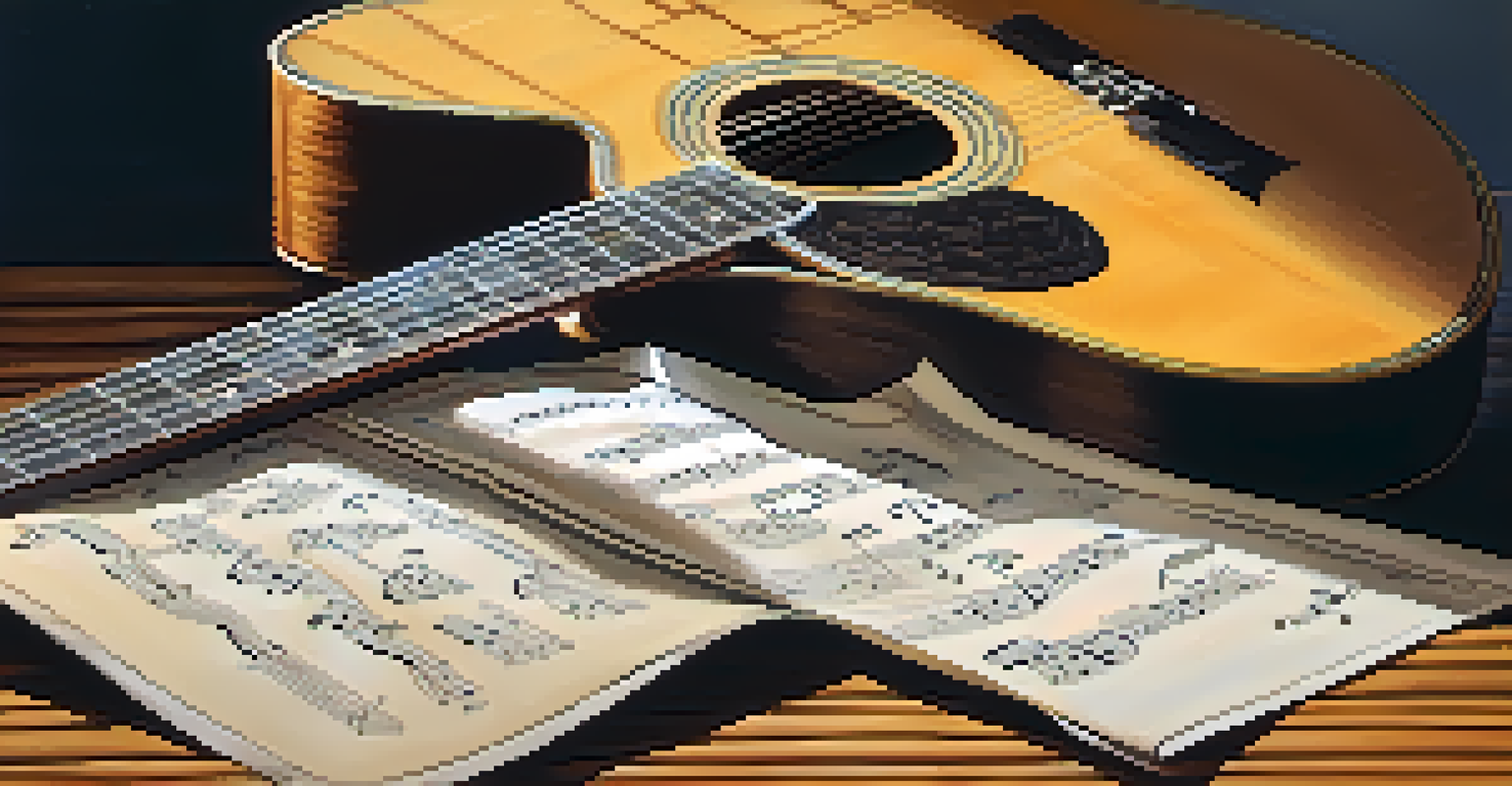Documentary Soundtracks: Crafting Real Stories Through Music

The Role of Music in Documentaries
Music plays a crucial role in documentaries, setting the emotional tone and enhancing storytelling. It can evoke feelings of joy, sadness, or tension, guiding viewers through the narrative. This connection helps audiences engage more deeply with the subject matter, making the experience more memorable.
Music can change the world because it can change people.
For instance, consider the impact of a moving score during a documentary about climate change. The music can amplify the urgency of the visuals, prompting viewers to reflect on the pressing issues at hand. Through sound, filmmakers can create an immersive atmosphere that resonates with viewers long after the credits roll.
Ultimately, music serves as a powerful storytelling tool that can transform factual content into a compelling emotional journey. By carefully selecting or composing a soundtrack, filmmakers can elevate the narrative and ensure that their message is felt, not just heard.
Types of Music Used in Documentaries
Documentary soundtracks often feature a diverse range of musical styles, from orchestral compositions to folk tunes. Each genre brings a unique flavor that can complement the documentary's theme and subject matter. For example, a documentary on rural life might incorporate acoustic guitar or banjo music to evoke a sense of place and authenticity.

Additionally, some documentaries utilize licensed popular songs to create familiarity and emotional resonance. Imagine a documentary showcasing personal stories of resilience; a well-known song about overcoming adversity could amplify the message and connect viewers on a personal level. This strategy helps bridge the gap between the subject and the audience.
Music Enhances Documentary Emotion
Soundtracks play a crucial role in evoking emotions and guiding viewers through the narrative.
Finally, original scores are often crafted specifically for documentaries, allowing composers to tailor the music to the filmmaker's vision. This customization ensures that the music aligns perfectly with the tone and pacing of the documentary, enhancing the overall viewing experience.
The Emotional Impact of Soundtracks
Soundtracks have a profound emotional impact on viewers, often acting as the heartbeat of a documentary. The right music can elicit tears, inspire hope, or provoke critical thought, all of which are crucial for effective storytelling. For instance, in a documentary about social justice movements, a passionate score can galvanize viewers and inspire action.
The power of music is such that it can take you to a place you never knew you needed to go.
Moreover, music can create a sense of nostalgia, transporting viewers back to specific times and places. This emotional connection can be particularly powerful in historical documentaries, where the soundtrack helps anchor the story in a particular era. By evoking memories or feelings associated with certain songs, filmmakers can deepen the viewer's engagement.
In essence, a well-constructed soundtrack is not just an accompaniment; it becomes an integral part of the narrative. It shapes how audiences perceive the story and influences their emotions, making it a vital element of documentary filmmaking.
Case Studies: Iconic Documentary Soundtracks
Several documentaries stand out for their exceptional use of music, leaving a lasting impression on viewers. For instance, '13th,' directed by Ava DuVernay, employs a powerful mix of contemporary and classical music that enhances its exploration of systemic racism in the United States. The soundtrack not only complements the visuals but also amplifies the urgency of the message.
Another notable example is 'Won't You Be My Neighbor?' which features a nostalgic soundtrack that evokes the warmth and kindness of Fred Rogers. The music helps create an emotional backdrop that resonates with audiences, reminding them of the show's themes of compassion and understanding. This connection is pivotal in making the documentary relatable and poignant.
Diverse Musical Styles Used
Documentaries utilize various musical genres, from orchestral to folk, to complement their themes and connect with audiences.
These case studies illustrate how a thoughtfully crafted soundtrack can elevate a documentary from good to unforgettable. By harnessing the emotional power of music, filmmakers can create a more impactful viewing experience that lingers in the hearts and minds of their audience.
The Process of Creating a Documentary Soundtrack
The process of creating a documentary soundtrack involves collaboration between filmmakers and composers or music supervisors. Initially, filmmakers develop a vision for the documentary, considering the emotional journey they want to take viewers on. This vision informs the type of music that will best support the narrative.
Once a direction is established, music supervisors often curate existing tracks that align with the film's themes. This involves extensive research and licensing negotiations to ensure the right songs are used. Original compositions may also be created, allowing composers to tailor the music to specific scenes and emotions.
Ultimately, this collaborative process is essential for crafting a soundtrack that enhances the documentary's impact. By carefully selecting and creating music, filmmakers ensure that the sound aligns seamlessly with the visuals, creating a cohesive and immersive storytelling experience.
The Future of Documentary Soundtracks
As technology advances, the future of documentary soundtracks looks promising, with new tools and techniques emerging. Digital audio workstations and software enable composers to experiment with sound in innovative ways, creating unique soundscapes that can enhance storytelling. This access to technology allows for more creative freedom and experimentation in the composition process.
Moreover, the rise of streaming platforms has broadened the audience for documentaries, making it essential for soundtracks to capture viewers' attention quickly. As attention spans shorten, the challenge lies in creating memorable and impactful musical moments that resonate with diverse audiences. This evolution may lead to more dynamic and engaging soundtracks that reflect contemporary trends.
Collaboration in Soundtrack Creation
Creating an effective documentary soundtrack involves close collaboration between filmmakers and composers to ensure music aligns with the narrative.
In summary, the future of documentary soundtracks is poised for growth and innovation, driven by technology and changing audience expectations. Filmmakers and composers will continue to explore new ways to use music, ensuring that sound remains a vital element of documentary storytelling.
Conclusion: The Power of Music in Documentaries
In conclusion, documentary soundtracks play an essential role in crafting real stories through music. They enhance emotional engagement, provide context, and elevate the overall viewing experience. The interplay between visuals and sound creates a rich tapestry that captivates audiences and allows them to connect with the subject matter on a deeper level.
As we’ve seen, the careful selection of music can profoundly impact how a story is received, whether through original compositions or licensed tracks. Documentaries that effectively use soundtracks not only inform but also inspire, leaving viewers with a lasting impression that encourages reflection and action.

Ultimately, the power of music in documentaries is undeniable. It has the ability to bridge gaps between different experiences, cultures, and perspectives, making it an indispensable tool for filmmakers who strive to tell authentic and impactful stories.